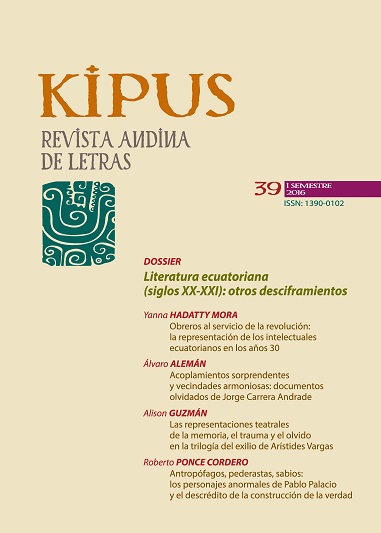Las representaciones teatrales de la memoria, el trauma y el olvido en la trilogía del exilio de Arístides Vargas
Contenido principal del artículo
Resumen
El dramaturgo y actor ecuatoriano-argentino, Arístides Vargas, representa, en su trilogía sobre el exilio, Flores arrancadas a la niebla (1995), Nuestra señora de las nubes (2000) y Donde el viento hace buñuelos (2004), la (des)memoria que resulta del destierro mediante los (des)encuentros de los protagonistas en espacios ectópicos e ilusorios, así como tiempos indeterminados y entreverados. Vargas echa mano al género absurdo, a la estética del surrealismo, amén del diálogo lírico, enigmático y desapegado, para hacer hincapié en el trauma asociado con varias clases de exilio, entre los cuales se incluyen: el de la mujer, el de los indefensos, el de la pobreza, el de la política, el de la violencia, el de la muerte, y el del olvido. Este ensayo examina, asimismo, las maneras por las cuales algunas teorías sobre la literatura del exilio, la dramaturgia de la memoria, el trastorno de estrés postraumático, además de la contramemoria y el olvido selectivo, se ven reflejadas en el teatro de Vargas.
##plugins.themes.bootstrap3.displayStats.downloads##
Detalles del artículo
Sección
Cómo citar
Referencias
Albaladejo, Tomás. “Sobre la literature ectópica”, en Rem tene, verba sequentur! Gelebte Interkulturalität. Festschrift, editado por Adrian Bieniec, Szilvia Lengl, Sandrine Okou y Natalia Shchyhlebska, 65. Geburtstag des Wissenschaftlers und Dichters Carmine/Gino Chiellino. Dresden: Thelem, 2011.
Bennett, Tony. “Stored Virtue: Memory, the Body and the Evolutionary Museum”. En Memory Cultures: Memory, Subjectivity and Recognition, editado por Susannah Radstone y Katharine Hodgkin. London: Transaction, 2006.
Borinsky, Alicia. One-Way Tickets; Writers and the Culture of Exile. San Antonio: Trinity, 2011.
Caruth, Cathy. Trauma: Explorations in memory. Baltimore: John Hopkins, 1995.
Dubatti, Jorge. “Nuestra Señora de las Nubes de Arístides Vargas: exilio, contario y estatus dramático múltiple de los recuerdos-relatos escenificados”. La revista del CCC [en línea] 16 (septiembre-diciembre de 2012).
Luarsabishvili, Vladimer. “Literatura ectópica y literatura de exilio: Apuntes teóricos”. Castilla: Estudios de Literatura 4 (2013).
Malkin, Jeanette R. Memory-Theater and Postmodern Drama. Michigan: Universidad, 1999.
Nora, Pierre. “Between Memory and History: Les Lieux de Mémoires”. En Memory and Counter-Memory. Traducido por Marc Roudebush. Número especial de Representations 26 (1989).
Ramadanovic, Peter. On Memory, Trauma and Identity. Lanham: Lexington Books, 2001.
Ricoeur, Paul. La memoria, la historia, el olvido. Argentina: Seuil, 2000.
Stewart, Susan. On longing. Narratives of the Miniature, the Gigantic, the Souvenir, the Collection. Baltimore: John Hopkins UP, 1984.
Vargas, Arístides. Flores arrancadas a la niebla, manuscrito, 1995.
Vargas, Arístides. Nuestra Señora de las Nubes. Donde el viento hace buñuelos. El deseo más canalla. Madrid: Casa de América, 2001.
Vargas, Arístides. Teatro ausente. Cuatro obras de Arístides Vargas. Buenos Aires: Inteatro, 2006.
Zemon Davis, Natalie, y Randolph Starn. “Memory and Counter-Memory”. Representations 26 (1989).


